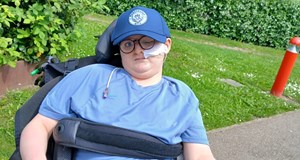Anxiety is one of the most common issues people experience and we’ve all felt anxious, especially at certain times. If you have an important deadline, are moving house or have a big date coming up, it’s normal to feel anxious and sometimes this can be a good thing! It can motivate you to finish a task or help you to prepare for your interview in time. However, for some, these feelings are harder to control, can feel unbearable and have a negative effect on their everyday life. If you feel this way, know that many people experience anxiety and it is highly treatable. Learn more about:
-Anxiety in the automotive industry
-Signs and symptoms of anxiety
-If anxiety becomes too much
-Causes
-Getting support
-Self-care tips
-How Ben can help
Anxiety in the automotive industry
43% of automotive people have struggled with feelings of anxiety during the last year, which shows just how common it is. (Ben's survey 2024). Anxiety isn’t something that only affects people in the automotive industry - in the UK, just over 1 in 10 people are living with an anxiety disorder at any one time (Mental Health UK) - that’s over 8 million people in the UK.
Signs and symptoms of anxiety
“Feeling trapped, feeling sick, headaches, not wanting to eat.”
“A feeling of fear which rushes through you. An overwhelming feeling of something bad.”
“I go over and over things in my mind, trying to work out all possible endings. I wake at night worrying about work.”
Do any of these feelings sound familiar? Anxiety can take many forms and differs from person to person. When you’re feeling anxious, your body will activate its fight or flight response and you may recognise some of the symptoms below, though it is unlikely that you will experience all of them.
Physical symptoms of anxiety
-Shaking
-Sweating
-Pounding heart
-Difficulty in taking a breath
-Rapid breathing
-Muscle pains
-Headaches
-Feeling of tension
Emotional symptoms of anxiety
-A feeling of impending doom
-A feeling of loss of control
-A sense of dread
-Feeling ‘on edge’
-Seeking lots of reassurance from other people
-Difficulty concentrating
-Irritability
Sometimes it might be difficult to work out whether your symptoms are totally related to anxiety, or might be related to a different illness. If you're experiencing any physical symptoms it's best to talk to your GP, so they can check out what may be causing them. Anxiety can be a symptom in its own right as well as a symptom of a wide range of other conditions, such as depression, obsessive-compulsive disorders, phobias and physical conditions. Your GP will be able to tell you more.
Impacts on daily life
Are your feelings of anxiety having a negative effect on your daily life? If you’re dealing with a lot of anxious thoughts, this can make it difficult to concentrate on work, school or anything else. Anxiety can also impact your sleep and some people find that they experience problems in relationships or friendships if they are anxious about socialising, trying new hobbies or going to specific places in case it triggers their anxiety. If anxiety is having a negative impact on your life, make an appointment with your GP- they'll be able to support you.
If anxiety becomes too much
Anxiety can feel very frightening and can often manifest itself in a physical way, mimicking serious conditions and leading people to believe they’re having a heart attack or even dying. The effects of an episode of anxiety may last for a few minutes, or even longer, spanning hours, days or weeks.
Charlotte, one of our Mental Health Advisors here at Ben, describes what to do if you’re experiencing anxiety.
“List how you feel just as an anxiety episode is coming on so you can recognise these signs early on and look for help at that point. Note the things that helped you to recover last time you were feeling this way. Write a note reassuring yourself that you have come through this before and will again. Intrusive thoughts and overthinking can be a problem, especially at night. If you experience this, try putting some headphones on and listen to music or audiobooks.”
Our Mental Health Advisors also recommend distraction techniques- take your mind away from the fears that have triggered anxiety. Listen to some music, be creative and draw, play a game on your mobile phone or count backwards. Tuning into something else gives your mind a chance to rest.
Causes
Experts believe that a variety of factors can contribute to and cause anxiety.
- Past Experiences - Childhood trauma or going through stressful or difficult experiences during adolescence can often lead to feeling anxious.
- Problems in daily life - This includes difficult situations or stressful life events such as losing a loved one or unemployment.
- Physical or mental health conditions - Physical health conditions, chronic conditions or mental health disorders such as depression are often linked to anxiety.
- Drugs or medications - Misusing drugs and alcohol can contribute to or trigger anxiety.
- Family history of anxiety conditions - Having a close relative with anxiety increases the likelihood that other family members will develop it.
Getting support
Anxiety can make certain tasks or situations seem like they are too much to take on and we can feel overwhelmed; but there are ways to beat it. It can often be beneficial to try a variety of treatments and see what works best for you. What works for one person might not work for someone else, so don’t be discouraged if the first technique you try doesn’t immediately have the effect you want it to. For some people, it could be enough to have therapy, such as CBT (Cognitive Behavioural Therapy). Often, if therapy alone does not resolve the anxiety then a dual treatment plan with medication is often recommended and can be an effective solution.
Therapy
SilverCloud
If you work or have previously worked in the automotive industry, you can have free access to SilverCloud, an online CBT platform. SilverCloud focuses on the relationship between your thoughts, feelings and behaviours and can help you develop positive coping strategies.
You can use SilverCloud on your own (self-help) or you can choose to be supported by one of Ben’s mental health advisors as you work through your chosen program(s). You can work through the programs at your own pace, any time, on your computer, tablet or phone.
Access SilverCloud: www.ben.org.uk/silvercloud
Talking therapies
Psychological therapies, such as Cognitive Behavioural Therapy (CBT) are often called talking therapies and you don’t need a GP referral to be able to access these. Here’s how you can refer yourself: https://www.nhs.uk/service-search/mental-health/find-a-psychological-therapies-service/. You could also be offered applied relaxation therapy to help relax your muscles in stressful situations.
Medication
Your doctor may prescribe you medication to help control your symptoms. There are a range of medications that are often used to treat anxiety such as antidepressants and beta-blockers. Though medication can be a very useful treatment, some anxiety medication only provides temporary relief from symptoms and can be accompanied by unwanted side effects. Your doctor will be able to talk you through all the pros and cons of the different medications.
Self-care tips
The power of breathing
Breathing sounds easy, but the physical symptoms of anxiety can make this seem difficult. One of the most effective things you can do is take a deep breath through your nose for four seconds, hold it for a few seconds and then breathe out through your mouth for four seconds. This will help calm your breathing and heart rate, allowing the body to relax.
Sally, the Therapy Lead here at Ben recommends a technique called box breathing. Practise this 3 times a day so it becomes second nature and is there when you need it.
Box Breathing
- Look for something square or rectangular, for example a door frame or window.
- Start at the bottom left corner, breathe in (this doesn’t need to be a deep breath) whilst following the frame up to the top left corner.
- Slowly (and quietly) exhale as you look from top left corner to top right corner.
- Breathe in whilst looking down the frame to the bottom right corner.
- Exhale slowly as you look across to the bottom left corner.
- Repeat this process.
You are what you eat
What you eat can significantly affect how you feel. Eat a balanced diet, watch your caffeine, alcohol and sugar intake and increase the amount of fruit and vegetables you eat. Along with using other therapies and tools, eating well can be an important part of your self-care. Read more about the link between anxiety and diet: https://www.health.harvard.edu/blog/eating-well-to-help-manage-anxiety-your-questions-answered-2018031413460
Supercharge your sleep
Getting enough sleep can have a huge impact on your overall wellbeing. “Anxiety is frequently connected to sleeping problems. Excess worry and fear make it harder to fall asleep and stay asleep through the night. Sleep deprivation can worsen anxiety, spurring a negative cycle involving insomnia and anxiety disorders.” Find out more at The Sleep Foundation.
Join a support group
Join a support group such as those organised by Anxiety UK or Triumph Over Phobia or join the forum and community chat at No More Panic to meet people experiencing the same condition as you and support each other.
Meditation
Studies have shown that meditation improves anxiety levels 60% of the time. After meditating for 6–9 months, almost two-thirds of those prone to anxiety managed to reduce their anxiety levels [Project Meditation]. Try regular meditation or mindfulness to help manage the symptoms of anxiety like this 10 minute meditation. There are also lots of mobile apps available so you can meditate on the move.
Talk to someone you know or an organisation
Taking the thoughts out of our heads can reduce the weight of the issue. It can often be very helpful to talk to someone you know – friends, family, colleagues- about how you’re feeling but that’s not always possible. If you don’t feel like you can talk to anyone around you, there’s some fantastic organisations that you can speak to confidentially who will be more than happy to support you as much or as little as you need it. Call or text Anxiety UK or contact No Panic for a helpline, recovery programs and further support. Remember you can always call us at Ben on 08081 311 333 between 8am and 8pm or chat with us online. For 24/7 support, give the Samaritans a call on 116 123.
Physical distractions
Exercise releases endorphins in your body, so any physically challenging activity will help the body to feel better as well as make you feel mentally more positive.
Keep moving
“In one study, researchers found that those who got regular vigorous exercise were 25 percent less likely to develop depression or an anxiety disorder over the next five years.”- Adaa. Scientists believe that exercise may help the brain improve the way it deals with stress. Make exercise into something you enjoy and look forward to. Whether your thing is running, hitting the gym, team sports, walking or anything else, enjoying your workout time will help you to exercise regularly and make you feel better in the long term.
We’re here for you
If you want someone to talk to about your mental health, talk to us. We’re here to help. You can call us on 08081 311 333 or chat with us online. We can support you in a number of ways, including assessing you and providing you with advice and treatments tailored to your specific needs.
We are here for anyone who works, or had worked in UK Automotive, and their family dependants. If you’re not sure if or how Ben can support you, please get in touch. Our friendly helpline team will be able to chat through your options and support you in a way that works best for you so you can stop feeling anxious and live your life fully, in the way you want to.
Further information and support
Talks and videos you may find useful
Try this relaxation technique from the NHS: https://www.youtube.com/watch?v=3cXGt2d1RyQ
How to stop being anxious about anxiety- Tim Box - therapist, author and anxiety expert https://www.youtube.com/watch?v=ZidGozDhOjg
Further information
Mind
-Anxiety and panic attacks - https://www.mind.org.uk/information-support/types-of-mental-health-problems/anxiety-and-panic-attacks/about-anxiety/
Healthline
-Signs and Symptoms of Anxiety Disorders - https://www.healthline.com/health/anxiety-disorder-symptoms
Mayo Clinic
-Anxiety disorders - https://www.mayoclinic.org/diseases-conditions/anxiety/symptoms-causes/syc-20350961












